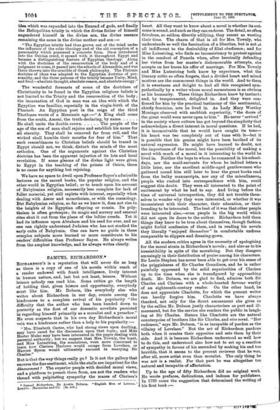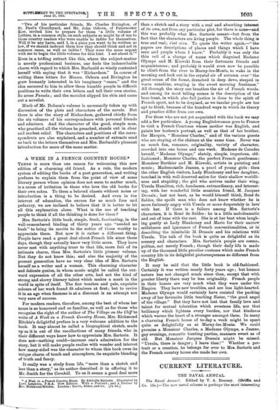SAMUEL RICHARDSON.*
RICHARDSON'S is a reputation that will never die so long as there is a copy of one of his novels within reach of a reader endowed with frank intelligence, lively interest in human nature, and, last but not least, leisure. Without
leisure nobody can read him. Some critics go the length of holding that, given leisure and opportunity, everybody must like him. Mr. Dobson, like everybody else who writes about Richardson in our day, counts among the hindrances to a complete revival of his popularity " the difficulty that the author who has been handed down to posterity as the first of our domestic novelists persisted in regarding himself primarily as a moralist and a preacher." He even suspects that in his own day Richardson's moral vein was a hindrance rather than a help to his popularity :— " Mrs. Elisabeth Carter, who had strong views upon duelling, may have cared for the discussion upon that topic ; and Miss Hester Mulso may have been interested in the pages dealing with parental authority ; but we suspect that Mrs. Townly, the toast, and Miss Lutestring, the seamstress, were more concerned to learn how Clarissa Harlowe would escape from Lovelace, or Harriet 'Byron would ultimately succeed in marrying Sir Charles."
But is that the way things really go P Is it not the gallery that encores the fine sentiment, while the stalls are impatient for the (lineament ? The superior people with decided moral views, and a platform to preach them from, are not the readers who thread with palpitating sympathy the mazes of Clarissa's
• SaMtUel Richardson. By Austin Dobson. "English Men of Letters. • London Macmillan and Co. [2s. net.]
heart. All they want to know about a novel is whether its out- come is sound, and such as they can endorse. The detail, so often frivolous, so seldom directly edifying, they resent as wasting their time. The charm of that is all for Mrs. Townly, who understands so well the fascination of a libertine, but is not at all indifferent to the desirability of filial obedience ; and for Miss Lutestring, who finds no inconsistency to protest against in the conduct of Pamela when, after heroically defending her virtue from her master's dishonourable attempts, she accepts on her knees his offer of marriage. For Mrs. Townly and Miss Lutestring both know by experience, what the literary critic so often forgets, that a divided heart and mixed motives are the commonest things in the world. And to them it is sweetness and delight to find all this recognised sym- pathetically by a writer whose moral earnestness is as obvious as his humanity. These things Richardson knew by instinct; and, by temperament, delighted in. And they were con- firmed for him by the practical testimony of the sentimental, chiefly feminine, sets he lived in. As Lady Mary Wortley Montagu observed with snobbish superiority, " the doors of the great world were never open to him." He never "arrived" in the society where culture has got beyond the simplicity that acknowledges a direct interest in moral questions. If he had, it is inconceivable that he would have caught its tone-- his heart was too completely out of tune with it—but it is possible that his genius might have been baulked of its natural expression. He might have learned to doubt, not the importance of the moral, but the possibility of making a novel with much of a moral in it interesting to the world he lived in. Neither the boys to whom he romanced in his school- days, nor the maid-servants for whom he indited letters a little later, nor the excellent middle-aged gentlewomen who gathered round him still later to hear the great books read
from the bulky manuscripts, nor any of the miscellaneous people who rushed into correspondence with him, could
suggest this doubt. They were all interested to the point of excitement by what he had to say. And living before the time of universal introspection, they did not trouble them- selves to wonder why they were interested, or whether it was inconsistent with their character, their education, or their breeding to be interested. The best of it was that other people were interested also,—even people in the big world which did not open its doors to the author. Richardson told them things they knew to be true about themselves, though fashion
might forbid confession of them, and in reading his novels they literally "enjoyed themselves" in comfortable undress comparable to slippers and dressing-gown.
All the modern critics agree in the necessity of apologising for the moral strain in Richardson's novels ; and also as to his irresistibility in spite of the moralising. But they disagree amusingly in their distribution of praise among his characters. Sir Leslie Stephen has never been able to get over his sense of the priggishness of Sir Charles Grandison, and he is rather painfully oppressed by the solid superiorities of Clarissa up to the time when she is transfigured by approaching death. Mr. Dobson, we are glad to find, admires both Sir Charles and Clarissa with a whole-hearted fervour worthy of an eighteenth-century reader. On the other hand, he does not appreciate Charlotte, for which the present writer can hardly forgive him. Charlotte we have always thanked, not only for the direct amusement she gives us by the sallies Mr. Dobson justly characterises as pert and ill- mannered, but for the service she renders the public in laugh- ing at Sir Charles. Sisters like Charlotte are the natural counterpoise of brothers like Sir Charles, and vice versa. "Her rudeness," says Mr. Dobson, "is as incapable of pardon as the villainy of Lovelace." But the art of Richardson pardons both when it creates their opposites and sets them by their side. And it is because Richardson understood so well how to do this, and understood also how not to set up a reaction of sympathy in favour of his scoundrel by making his end too horrible, that it seems to the present reviewer that he was, after all, more artist even than moralist. The only thing he was not is a realist. For that part he was altogether too natural and incapable of affectation.
Up to the age of fifty Richardson did no original work. He wrote prefaces, dedications, and indexes for publishers. In 1739 came the suggestion that determined the writing of his first book :— "Two of his particular friends, Mr. Charles Rivington, of St. Paul's Churchyard, and Mr. John Osborn, of Paternoster Row, invited him to prepare for them • a little volume of Letters, in a common style, on such subjects as might be of use to those country readers who were unable to indite for themselves. Will it be any harm, said I, in a piece you want to be written so low, if we should instruct them how they should think and act in common cases, as well as indite ? They were the more urgent with me to begin the little volume for this hint. I set about it."
Even in a trifling extract like this, where the subject-matter is merely professional business, one feels the indescribable charm with regard to which Mrs. Barbauld so wisely contented herself with saying that it was " Richardson." In course of writing these letters for Messrs. Osborn and Rivington he
grew humanly interested in his imaginary "cases," and the idea occurred to him to allow these humble people in difficult positions to write their own letters and tell their own stories. So arose Pamela ; and the moralist slipped his skin and came out a novelist.
Much of Mr. Dobson's volume is necessarily taken up with discussion of the plots and characters of the novels. But there is also the story of Richardson, gathered chiefly from the six volumes of his correspondence with personal friends and admirers. And the character of the good, simple man, who practised all the virtues he preached, stands out in clear and modest relief. The characters and positions of the corre- spondents are also explained, and a number of extracts send us back to the letters themselves and Mrs. Barbauld's pleasant introduction for more of the same matter.























































 Previous page
Previous page